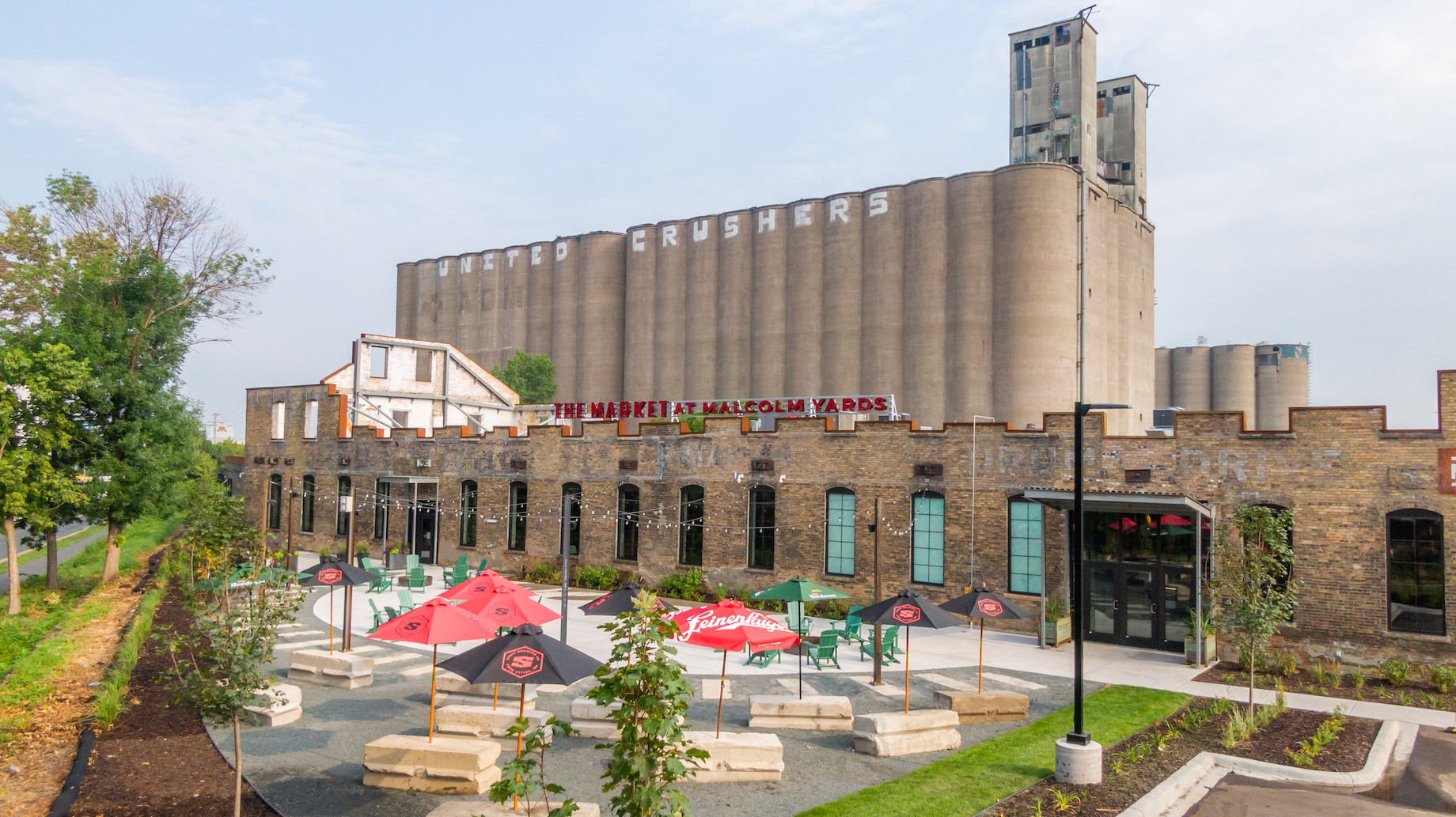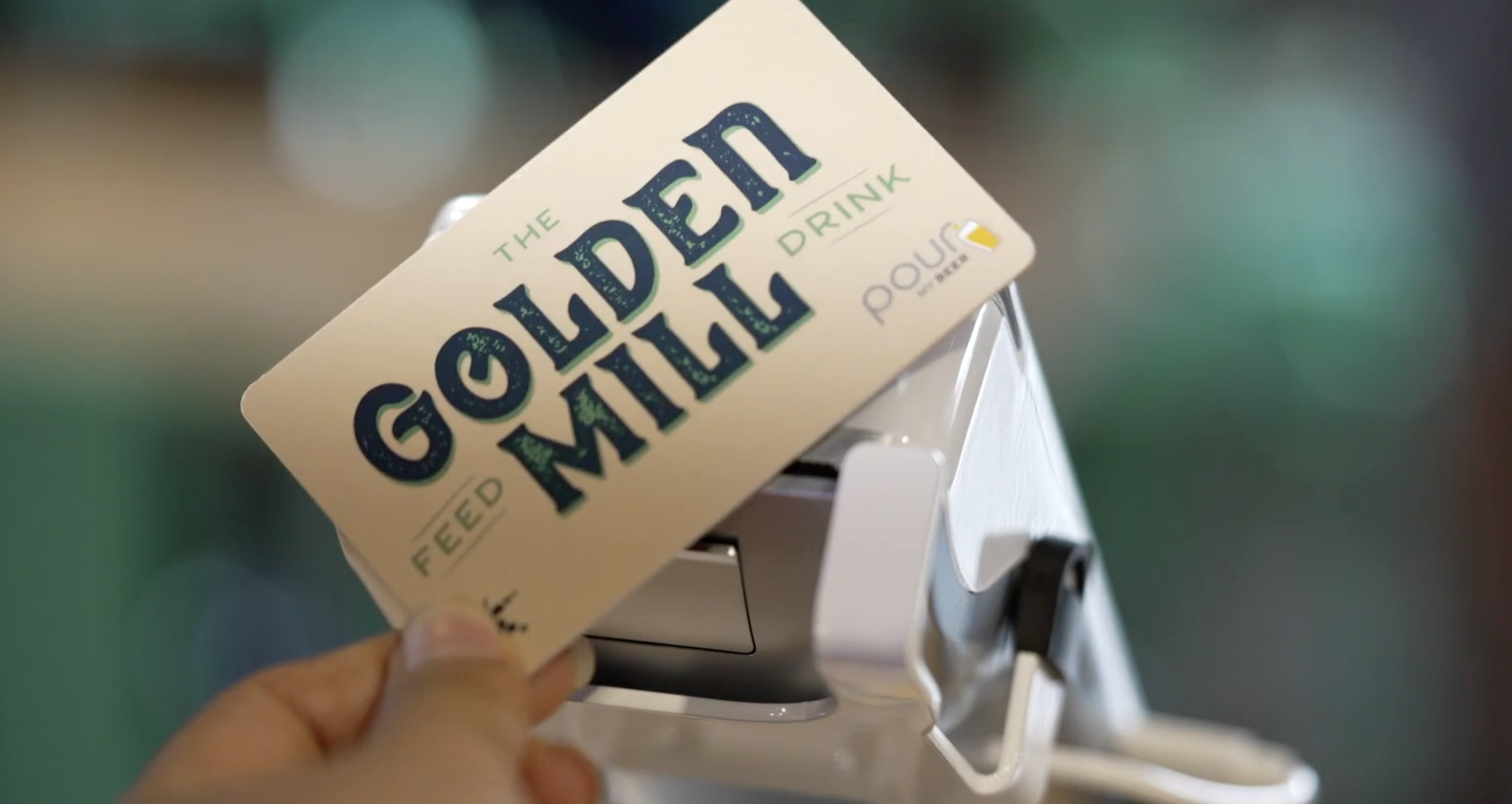Tim McLaughlin wanted to streamline the customer experience at his Caboose Brewing Co. in Vienna, Virginia, and the POS system he developed also has made accounting and percentage rent a snap for tenants at food halls.
The multiple-points-of-sale model has grown cumbersome for vendors and landlords, said McLaughlin. His GoTab, he said, attracts bookkeeping-averse vendors and has something landlords like, too: “GoTab allows landlords to take on a little more risk on tenants because they know they can pay percentage rent because it’s automatically taken, and customers get the same quick-commerce experience they’ve come to enjoy with online shopping and food delivery,” said co-founder and CEO McLaughlin.
For visitors to food halls, lines move faster, and payouts for groups are easier. The integrated point-of-sale system gives patrons more time to cool their heels at dining tables, pour themselves beverages off a self-serve beer wall or explore. “Say you want a beer and a taco and maybe a slice of pizza. There’s no reason you should have to pay multiple times,” said McLaughlin.
Under GoTab Pass, staffers check a guest’s ID and then configure a credit card and mobile number to a branded RFID card or wristband. From there, a guest orders and then moves through checkout at each vendor by tapping the card or wristband on the merchant’s payment processor. The guest then gets a phone notification when the order is ready for pickup. At the end of the visit, the guest drops the RFID card or wristband into a bucket at the exit and receives a receipt via text message for all transactions made that day. “By digitizing the checkout process and eliminating the need to run a typical credit card and close individual transactions at each vendor, lines move a lot faster,” McLaughlin said. Guests may prepay a specific amount and will get refunded automatically if they spend less, so parents can get cards or bands for their kids with a limit, say $20. And because guests show their IDs when they get their cards or wristbands, underage visitors can’t order alcohol.
Among visitors to The Market at Malcom Yards in the Prospect Park neighborhood of Minneapolis, the RFID card/wristband system resonates with the younger set, party planners and large groups, said co-owner Patricia Wall. “They love that they can all have their own tabs and don’t have to worry about settling up or splitting a tab.”
Streamlined Accounting and Percentage Rent
Revenue from the completed transactions automatically flows to each vendor, minus percentage rent charges. “Everybody can go into the terminal and look at their accounts and see the sales immediately,” said Wall, of The Market at Malcom Yards, which uses GoTab. McLaughlin said: “That’s an attraction for restaurants, which tend to be accounting challenged.” At The Market at Malcolm Yards, tenants do indeed appreciate the simplified accounting process, Wall said, and have enjoyed increased credit card sales since GoTab was installed last July. That owes in part to the ease of ordering and reordering, she said.
Another landlord told McLaughlin it had been getting shorted about 30% of sales before GoTab’s pinpoint sales tracking. While landlords can see their tenants’ transactions instantly, tenants can’t see how other tenants are performing, McLaughlin noted.
But there are challenges, too. “One is getting in front of people and making them understand GoTab and the fact that it takes care of accounting and there is no similar product” that includes multivendor and rent-tabulation use, McLaughlin said. Like other new ideas, “it just takes time to sink in.” Additionally, getting all tenants to agree in their contracts and leases to use the system can be a problem, he conceded.
GoTab processes more than $500 million in transactions annually and operates in 35 states and in Canada. Several U.K. sites soon will adopt the technology, McLaughlin said. The company is expanding thanks in part to a recent capital infusion. “We’ve been pretty careful and are spending it slowly, building product,” McLaughlin said. “We will be cash-flow positive by the end of the year.”
Ultimately, the technology is applicable to such things as e-commerce, catalog fulfilment and pick-and-pack operations, he said, noting that the name was chosen in part because it doesn’t associate exclusively with food-and-beverage.
Attracting Vendors and Visitors
In their travels, Wall — a Culinary Institute of America graduate whose résumé includes stints as a food writer, a Dayton’s department store worker, a caterer and a real estate developer — and her developer/investor husband, John Wall, had enjoyed visiting food halls but often found themselves put off by the repeat, lengthy line-waits as they cobbled meals together from various stations. “You didn’t know when your food was ready, and you’d just stand there when you could be ordering a drink or walking around,” she recalled. “My thought then was that these halls really could use a card with some kind of integrated POS system that sends you texts when orders were ready.”

Patricia and John Wall had been leaning toward a biotech park as the first development at their 27-acre property in the Prospect Park neighborhood of Minneapolis. By chance, they would meet Go Tab co-founder and CEO Tim McLaughlin while he was working on his point-of-sale system for multivendor venues. The conversation piqued the Walls’ interest enough that they opted for a food hall instead of a biotech park. The 19,000-square-foot Market at Malcolm Yards debuted in August 2021 with nine stalls and a 20-tap PourMyBeer wall featuring pay-by-the-ounce beer, wine and other beverages.
Since The Market at Malcolm Yards implemented GoTab in July 2022, zero tenants have turned over, “and there’s now a waiting list, including several high-end chefs,” Wall said.
Another GoTab-equipped food hall, Colorado’s Golden Mill, also sought an improved customer experience. It bought into GoTab’s POS, making it far easier for patrons to navigate its two PourMyBeer walls totaling 56 taps, Golden Mill officials noted in a testimonial on GoTab’s website. Guests frequently laud their newfound freedom to get food and beverage quickly using a single card or wristband, a Golden Mill representative told GoTab, and service speed and staffing efficiencies have improved as a result. As guests exit for the night, they drop their cards or bands in locked boxes. When the facility closes tabs at night’s end, it texts final bills to any guests that didn’t close their tabs.

Visitors to Colorado’s Golden Mill food hall buy and pour their own beverages from 56 taps on two PourMyBeer walls and pay using RFID-enabled cards linked to their credit cards.
By Steve McLinden
Contributor, Commerce + Communities Today